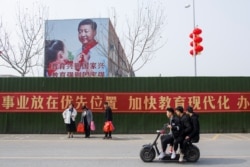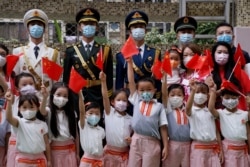Throughout China, as the school year starts on September 1, all elementary and secondary school students face a new mandatory class — Xi Jinping's Thought on Socialism with Chinese Characteristics for a New Era.
The new curriculum highlights how the Chinese Communist Party (CCP) and Xi are focusing on ideological control of the population as the course, referred to as "Xi Thought," trickles down from Chinese universities, where it was introduced in 2020.
"Propaganda and political instruction have been part of education in China since 1949, as the Communist Party understands exactly the power of shaping people's minds, especially when they are young and malleable," said Didi Kirsten Tatlow, a senior fellow at the Asia Program of the German Council on Foreign Relations in Berlin, Germany. Chinese leader Mao Zedong declared the CCP had founded the People's Republic of China (PRC) on October 1, 1949.
It's no surprise, Tatlow added, that as Xi prepares to extend his rule beyond the once customary two five-year terms, he and the CCP want his philosophy, or "thought," to be taught to children as young as 6 to make it seem as normal a part of education as multiplication tables.
"This is how to control the next generation and ensure continued support for the party and for Xi. Coupled with an ongoing push to 'party-build' in all walks of life including business, it shows Xi and the party are doubling down on ideological control," she told VOA Mandarin in an email interview. "Party building" refers to efforts to purify CCP organizations and strengthen support from party members as well as average Chinese citizens.
Perry Link, an expert on contemporary Chinese politics and a distinguished professor at the University of California, Riverside, agreed, telling VOA Mandarin, "It's time that we call a spade a spade. This is brainwashing."
Guideline issued
The Chinese Ministry of Education made the new course mandatory for elementary through graduate school students in its guideline published on August 24, which expands a requirement that began at the university level in the fall of 2020.
According to the guideline, primary schools will focus on "cultivating love for the country, Chinese Communist Party and socialism so they will follow the Party from a young age." In middle school, the class will showcase CCP accomplishments and help students "understand the essence of Xi Thought."
Since becoming China's paramount leader in 2012, Xi has concentrated power and encouraged a Mao-like personality cult around himself by inserting his political writings into CCP and government works.
This is not the first time a Chinese leader's thoughts and vision for the country have been incorporated into textbooks. Works by former leaders Hu Jintao, Jiang Zemin and Mao have been included in elementary and secondary school syllabi.
The current push to elevate Xi Thought, however, comes as the CCP is stepping up ideological and political efforts to go beyond party members and target "all of society."
While many, if not most, nations use school textbooks as a way of forging a national identity, Beijing's introduction of the new curriculum coincides with the CCP increasing already tight controls over civil society, even as China faces international condemnation for its treatment of the largely Muslim ethnic Uyghur minority in Xinjiang and the crackdown on freedom of expression in Hong Kong.
Penetrating brains
According to China's Ministry of Education, there are four versions of the textbook, each geared to different levels of students. The new curriculum will be taught throughout the country to make sure the content will "get into the brains of students."
The new textbook includes familiar slogans and topics such as "There's no new China without the Communist Party" and "Protecting national security is every citizen's duty." It also includes topical references such as "'One Country, Two Systems' is a great invention," referring to the model of governance that was supposed to guarantee that Hong Kong's political and legal system remain intact until 2047, or 50 years after the territory reverted from British to Chinese control in 1997.
To get a better sense of the new textbooks, VOA Mandarin read the grade 3 version, which has 52 pages divided into six chapters.
In the second chapter, "We Follow the Communist Party Wholeheartedly," Xi appears in six photos in a subsection called "Grandpa Xi Jinping's heart is with the people." The images show him visiting deaf girls in an Inner Mongolia orphanage in 2014, shaking hands with workers at a marine instruction site in the coastal city of Qingdao in 2018, talking to Beijing residents during the Lunar New Year holiday in 2019, visiting a poor family in Chongqing in 2019, chatting with a local family in Gansu province in 2019, and making rice cakes with ethnic minorities in a Yunnan province village in 2020.
In illustrations, children say: "Grandpa Xi Jinping tells us a person can have many aspirations, but the most important aspiration in life should be connected to the country and the people" and "Grandpa Xi Jinping tells us we should establish the value of 'labor is glorious' when we're young."
In the fifth chapter titled "We Are the Successors of Communism," in a subsection called "Grandpa Xi Jinping's expectations for us," photos show a smiling Xi surrounded by schoolchildren, planting trees with Young Pioneers, and holding still as a young girl ties a red Young Pioneer scarf around his neck. The last page of the subsection is a letter written by Xi to congratulate the Chinese Young Pioneers on the organization's 70th anniversary. The nationwide youth organization enrolls all Chinese children ages 6 to 14.
"Ever since Xi Jinping took power, especially in the last few years, not just in school history textbooks but also the party's own history archives, have had more exposure of Xi," said Yang Jianli, founder of the U.S.-based rights group Citizen Power Initiatives for China. He added that what is happening now is more aggressive than when Mao led China and that the new curriculum reminded him of George Orwell's "1984."
Tracy Zhang, a teacher and a parent in central China's city of Xi'an, said parents have little control over what their children are exposed to in school. She asked VOA to use a pseudonym in fear of attracting attention.
"We cannot control what the schools teach our kids unless we send our kids to international schools," she told VOA Mandarin. The students will have to pass exams to graduate. So we don't have a choice. The government probably doesn't think the current brainwashing is enough."
Lin Yang contributed to this report.


